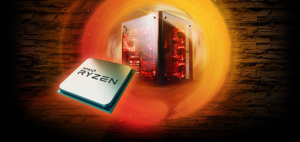
AMD has for a number of years been kicked into the long grass by Intel in producing processors. Whichever way it’s measured, sheer performance, market share, sales figures or reputation, Intel has controlled the desktop and laptop chip processor market. However AMD has been preparing a very significant challenge to fight back. In early 2017 AMD announced the details of its next series of chips and took the market by storm. AMD had found a way to make its chips competitive with the very best Intel chips and even better in some instances, so the two groups finally have parity. AMD has come to market with an extremely aggressive pricing strategy, in some instance half the price of the equivalent Intel Chip. So far in April 2017 only the highest end chips have been released but signs look promising that AMD has made a very competitive product for each market segment with budget and mid-range chips due to be released autumn 2017. This development could encourage price drops across the board for PCs.
In recent years the desktop and laptop processor market has been completely dominated by a single company, Intel. In previous decades there has been much more parity between the two big chip manufacturers as AMD had more competitive products and could command better market share. This market is dominated by statistics and enthusiasts and reviewers care a great deal about the raw processing figures of each chip, this then filters down to the mass market where chips and brands gain good reputations and consumers tend to trust the brands they know in this market and compared to other markets, there is very limited choice anyway.
This situation of Intel dominating the market has been bad for the processor industry and the PC market itself. Intel’s lineup of processors has become bloated and impenetrably complex. Each new line of Intel chip technology has done relatively little to improve significantly over the quality and speed of the last, each new release has been mainly about securing price points rather than introducing some big technological advancement. With AMD not having a competitive product on the market Intel has been allowed a great deal of freedom to charge whatever it likes for its chips that add incremental improvements and meaning that processor prices have been inflated for a number of years.
AMD has clearly been working to rectify this situation though and in January 2017 the launch of its next generation of chips, called RYZEN, has been a resounding success. AMD has managed to produce chips that have parity with Intel’s leading products and has chosen to massively undercut the corresponding Intel chip all the way through its lineup. The first chip to come on sale is the Ryzen 7 priced around $500 and it easily matches or supersedes its Intel competitor, the I7 6900k, which is a $1,000 chip.
Some minor issues have been noted in the first months of Ryzen’s release. Most notably there have been some stability issues in the chips and a lack of compatible motherboards available and this has attracted some largely unwarranted criticism; unwarranted because, AMD has fixed these issues only weeks later. It would not therefore be surprising to see AMD’s share price and indeed its market share grow significantly if Intel cannot respond in a meaningful way.
Intel has dominated the processor market for the best part of a decade and whilst their chips are undoubtedly the best available, they have suppressed the market with a lack of further development and prices that are difficult to justify. AMD’s Ryzen product looks set to be a world beater as it can match Intel in ability but beats it significantly on price.
For further reading please see our analyst insight on AMD Ryzen at https://www.marketline.com

